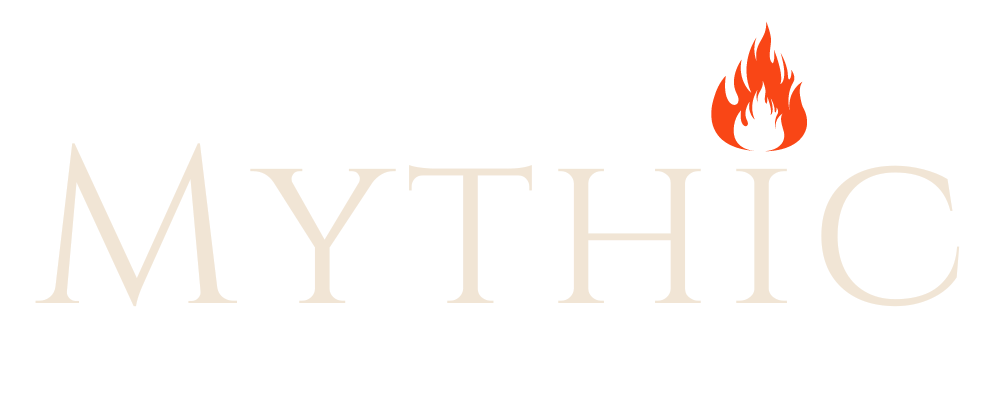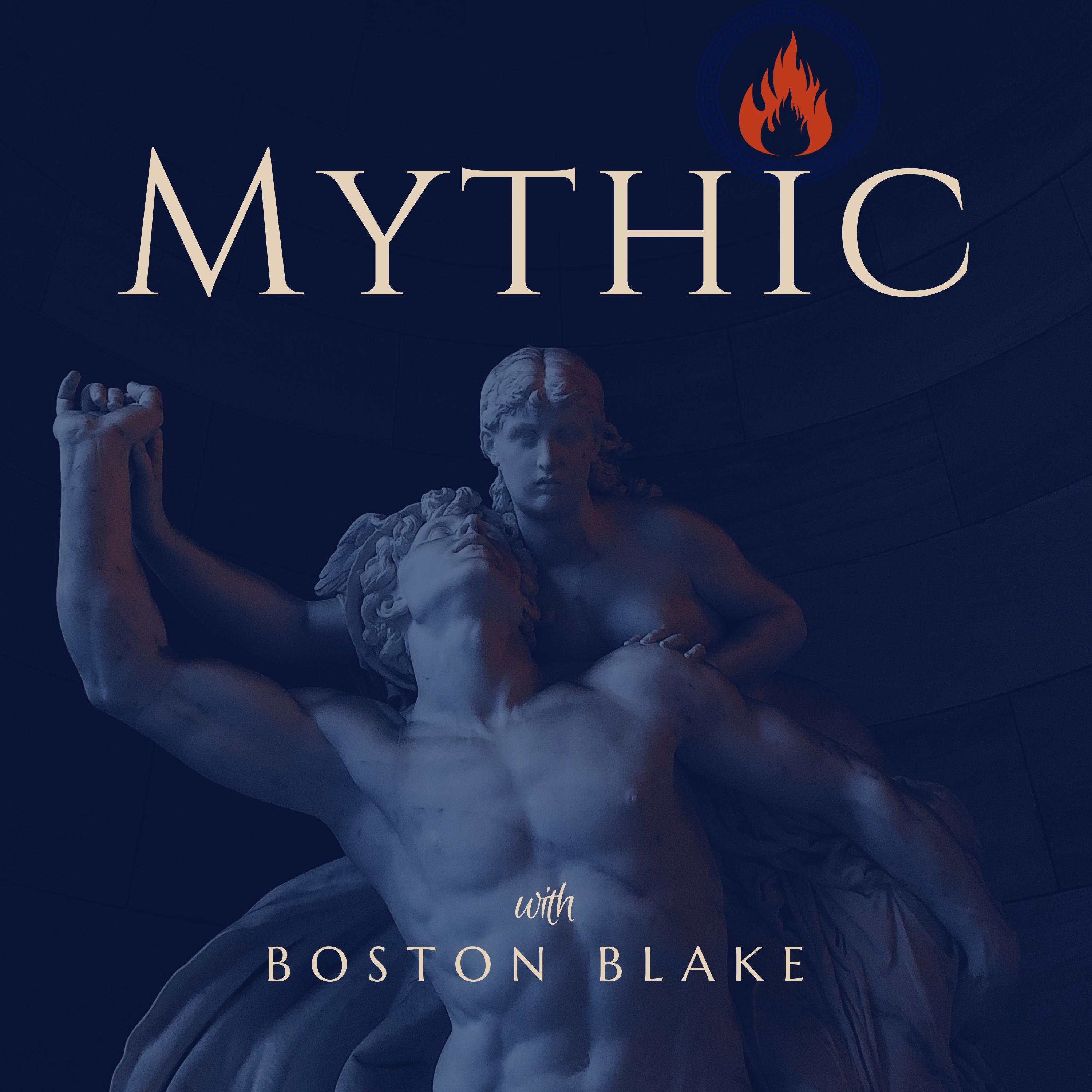Greek Creation Myth: The Beginning
Host Boston Blake connects the dots between Wonder Woman, Aphrodite, and the origin of the world according to Greek mythology.
Persons, places, and things mentioned in this episode:
Transcript
Welcome to Mythic, a podcast where we explore meaningful
Speaker:living through the power of myth.
Speaker:I'm your host, Boston Blake.
Speaker:So this podcast came out of a question.
Speaker:At the beginning of 2020, I was prepping for a PhD program in mythological studies.
Speaker:I've been obsessed with mythology since I was a little kid, but in the wake of the
Speaker:COVID outbreak, I had to close my body work practice and my income dried up to
Speaker:nothing and grad school was off the table.
Speaker:The question became, what's another way to engage with other nerds who love mythology
Speaker:enough to go into a lifetime of debt, just to discuss and learn about them.
Speaker:So here we are, welcome to the podcast.
Speaker:It's my attempt to teach some of what I know and learn.
Speaker:What others think about this stuff
Speaker:Now, where to start?
Speaker:Yeah.
Speaker:The beginning of time is just too far back.
Speaker:Let's start with the beginning of my obsession.
Speaker:Wonder Woman.
Speaker:That's way more fun, anyway.
Speaker:If you've seen the movie, you know that Wonder Woman, also known as Princess
Speaker:Diana of Themyscira, is an Amazon.
Speaker:Amazons were an all female tribe from Greek mythology.
Speaker:Whether they were historically real is a matter of some debate, but based on the
Speaker:evidence I've read, I believe they were.
Speaker:The movie says that Diana was the daughter of Zeus, but that is a damn lie.
Speaker:Wonder Woman was sculpted from clay by her mother and given life by Aphrodite.
Speaker:She didn't have a dad.
Speaker:That was kind of her thing.
Speaker:She grew up to possess, and I quote: the wisdom of Athena, the
Speaker:strength of Hercules, the speed of Mercury, and the beauty of Aphrodite.
Speaker:Now I was five years old when I learned this.
Speaker:Now, today, I know that it's still a pretty big departure
Speaker:from classical mythology.
Speaker:According to which the queen of the Amazons is the daughter of Aries.
Speaker:The god of war, Ares, was the guy in the movie with the bad mustache that
Speaker:Diana blew a hole in his chest with her unexplained magic lightening powers.
Speaker:But that's not the point.
Speaker:The point is that as a kid, I had to know who these characters were.
Speaker:I was five and reading at the "see spot run" level, not so much the
Speaker:level of the "daughter of Hippolyta who relinquished her immortality."
Speaker:But the fates smiled upon me.
Speaker:The very next year, Clash of the Titans was released in theaters.
Speaker:Not only did it instill in me a lifelong irrational fear of
Speaker:scorpions, it also introduced me to the larger world of Greek mythology.
Speaker:Zeus and the Olympians, the hero Perseus, Pegasus, the winged horse,
Speaker:and Medusa, who was really just minding her own business when Perseus
Speaker:came and chopped her head off.
Speaker:But that's another story for another episode.
Speaker:Even though the movie wasn't totally true to the myths, it captured their
Speaker:essence and their astounding sexism, and it remixed them into a fantastic
Speaker:movie that I love to this day.
Speaker:They tried to remake it in 2010 and well, Hey, Sam Worthington is hot.
Speaker:So there's that.
Speaker:Anyway, as my reading improved, I sought out D'Aulaires' Book of Greek Myths,
Speaker:Edith Hamilton's Mythology, and anything else that mentioned gods and heroes.
Speaker:I loved these stories, but there was something else.
Speaker:They seemed familiar somehow.
Speaker:It would take decades to name it.
Speaker:But I eventually came to recognize the Greek stories as
Speaker:complex multi-level metaphors.
Speaker:They were at once a weather map of my own psyche, my own inner world, and a
Speaker:template for all the political and social dynamics that I saw going on around me.
Speaker:Myths are stories of archetypes in motion.
Speaker:They're universal repeating patterns.
Speaker:Joseph Campbell called myths, public dreams, and dreams, private myths.
Speaker:No, it's not the only collection of great stories.
Speaker:The Bible contains incredible teaching stories, but I could
Speaker:never get into it because it was taught to me as factual history.
Speaker:And that just didn't make sense.
Speaker:Even when I was five.
Speaker:Mythology was allowed to stand on his own without any dogma.
Speaker:That let me observe these ancient patterns in the stories and in modern
Speaker:life and make those connections.
Speaker:The first deity I dove into was Aphrodite.
Speaker:She's the goddess of love, but what does that mean?
Speaker:Where did she come from?
Speaker:The short answer is that she was born from the sea foam.
Speaker:And that's accurate.
Speaker:In fact, her name derives from aphros, which means foam.
Speaker:But that answer is woefully incomplete.
Speaker:It's like a kid asking where do babies come from and answering mommy's belly?
Speaker:Sure.
Speaker:It's not a lie, but it leaves out some pretty important details.
Speaker:So where did Aphrodite come from?
Speaker:Well, to answer that.
Speaker:Okay.
Speaker:Really answer that.
Speaker:Now we're going back to the beginning of time.
Speaker:But before we do, two things I need to note.
Speaker:First, the Greek myths are from an oral tradition.
Speaker:They had been told and retold for centuries before anyone wrote them down.
Speaker:There is no true version.
Speaker:There are only different versions told by different people for different reasons.
Speaker:This is my telling, combining various versions I've heard and read
Speaker:into a story that I hope is both entertaining and illuminating, but
Speaker:also true to the facts as they were recorded in the oldest versions.
Speaker:In general, I lean on Hesiod, Homor, and Apollodorus to provide
Speaker:the most essential story bits.
Speaker:Secondly, I am an American.
Speaker:We're just getting used to the word gyro.
Speaker:I will undoubtedly butcher the pronunciation of a great
Speaker:many beautiful Greek names.
Speaker:My pronunciation choices are pale imitations of Stephen Fry from his Mythos
Speaker:book because I love Stephen Fry and I want to be just like him when I grow up.
Speaker:Now.
Speaker:The beginning of time, or really just before.
Speaker:What was before time?
Speaker:Well, the primordial elements.
Speaker:And there were five of them.
Speaker:At least five that concern us right now.
Speaker:Anyway, they were Chaos, Gaia, Tartarus Eros, Erebus, and Nyx.
Speaker:What exactly does primordial mean, anyway?
Speaker:It comes from the Latin word primordius.
Speaker:It's a compounding of Primus, meaning first and ordiri, meaning to begin.
Speaker:So primordial refers to what has existed from the beginning.
Speaker:In biology, it indicates the earliest stages of cell development.
Speaker:In the beginning, that was only Chaos, the void, the ultimate primordial
Speaker:deity, sentient nothingness.
Speaker:The Greek word we've translated as chaos meant chasm or abyss, but
Speaker:this myth has made its way all the way into scientific storytelling.
Speaker:The default state of the universe, quantum physics tells us, is entropy.
Speaker:That is to say Chaos.
Speaker:From Chaos the universe emerged and to Chaos it shall return.
Speaker:Everything that seems so solid now, from our bodies to our buildings
Speaker:to our civilizations will one day decay, and where their shapes
Speaker:once were, will be emptiness.
Speaker:And I think that in all of Greek myth, Chaos is the only entity that is not
Speaker:gendered, which I find fascinating.
Speaker:You want to see a picture?
Speaker:Check out the Hades video game.
Speaker:It's so freaking rad.
Speaker:From Chaos, gaia emerged.
Speaker:Not Chaos' child, but a divinity who formed within the emptiness,
Speaker:something solid, a place to stand something orderly within the chaos.
Speaker:Gaia, not yet mother earth, was not just the mud and the clay and the
Speaker:dirt, but the entire material world.
Speaker:In fact, the words, material and matter derived from the
Speaker:Latin word for mother mater.
Speaker:Gaia, whose Roman name was Terra as in terra forma, terrain, and terrestrial.
Speaker:And along with Gaia came a being called Tartarus.
Speaker:Now, was Tartarus a god or a place.
Speaker:Well, why not both?
Speaker:This is an important thing to understand about Greek myth.
Speaker:Everything had a spirit, a unique sentience earth, sky, rivers, caves,
Speaker:emotions, and even concepts as fundamental as beauty or abstract as commerce.
Speaker:Everything was animated, meaning it had an animus or anima, a
Speaker:soul-- even emptiness itself.
Speaker:This is difficult, if not impossible, for us to really grasp in today's world.
Speaker:We are deeply conditioned to separate body, mind and spirit.
Speaker:But in these tales, nearly everything possessed all three.
Speaker:Tartarus then was a personified place, situated deep beneath Gaia.
Speaker:It was a hellish realm in the furthest reaches of the underworld.
Speaker:And it would serve as a prison for the violent monsters and human criminals.
Speaker:Psychologically tartar us is where we would exile parts of ourselves that
Speaker:terrify us, that we think are dangerous and that we have to submerge in order to
Speaker:build and maintain human civilization.
Speaker:And regardless of the sound and spelling Tartarus has absolutely nothing to do
Speaker:with a calcified gunk on your teeth.
Speaker:Also out of Chaos came the god Erebus, the darkness, and the goddess Nyx, the night.
Speaker:And then there was Eros, the irresistible god of love, who could
Speaker:make men and gods alike, abandoned reason in pursuit of passion.
Speaker:Eros, the force that pulls living things together to mate, and also
Speaker:maybe the same magnetic force that binds the entire universe together.
Speaker:It was Eros who made it possible for Erebus and Nyx to conceive the goddess
Speaker:Hemera, the day, and the god Aether, the light, or perhaps the visible space.
Speaker:This story might be thought of as the story of the development
Speaker:of human consciousness at the individual and collective level.
Speaker:As infants, we begin in the undifferentiated experience
Speaker:in our mother's womb.
Speaker:When we're ejected from that, we become aware of something that is not us.
Speaker:We may differentiate darkness from light.
Speaker:Eyes closed from eyes open.
Speaker:We find comfort in the solidity of our mother's body, which
Speaker:supports and nourishes us.
Speaker:And thanks to Eros, we have desire to pull us forward.
Speaker:Then eventually we begin to explore the world beyond.
Speaker:Now back to the story.
Speaker:All on her own Gaia gave birth to two sons.
Speaker:Pontus, the sea, and Oruanos, the sky, who would become her mate.
Speaker:We usually pronounce his name Uranus, but since I have the sense of humor
Speaker:of a 14 year old, I'm going to leave Uranus alone and stick with Ouranos.
Speaker:Otherwise we'll never get anywhere.
Speaker:Also on her own Gaia, birthed mountains, hills, valleys, and all the terrain where
Speaker:all the action would eventually happen.
Speaker:Because if you think about it, nothing had actually happened yet.
Speaker:Nothing could actually happened yet.
Speaker:In fact, everything I just described had to happen all at
Speaker:once and it couldn't happen at all because time hadn't started yet.
Speaker:And without time there are no happenings.
Speaker:Just be with that for a second.
Speaker:I'll wait.
Speaker:Now, Ouranos and Gaia became inseparable.
Speaker:Literally.
Speaker:He covered every inch of her.
Speaker:The two of them locked in internal coitus, Mother Earth and Father
Speaker:Sky were the worlds first couple.
Speaker:And their incessant lovemaking spawned lots of kids.
Speaker:The first brood included 12 gigantic powerful, beautiful
Speaker:beings, six male and six female.
Speaker:The Titans.
Speaker:One of these 12 Titans was Mnemosyne.
Speaker:She was Memory.
Speaker:And with Memory, we start to be able to link events.
Speaker:And before and after start to take on meaning.
Speaker:This is the beginning of time.
Speaker:Now with time started, the insatiable Ouranos, who had nothing else
Speaker:to do, impregnated Gaia again.
Speaker:This time she bore the Hekatonchires.
Speaker:Their description is in their name.
Speaker:Hekaton means 100 and chire or chire means hands.
Speaker:And to add to this biological impossibility, the Hekatonchires.
Speaker:Oh, I love saying that word.
Speaker:The Hekatonchires also had 50 heads each.
Speaker:If there happens to be an artist listening, I would love it.
Speaker:If you would draw a picture of this and send it to me.
Speaker:What does this look like?
Speaker:50 headed 100 armed monsters.
Speaker:It makes my brain stop.
Speaker:My best guess is that it was, is a metaphor referring to various tribes
Speaker:of about 50 people, strong and dangerous, but unorganized and barbaric.
Speaker:But I am totally pulling that out of my ass.
Speaker:Gaia's third and final set of children were the triplets, the Cyclopes.
Speaker:Okay.
Speaker:You probably know these guys.
Speaker:Giant one eyed, monsters.
Speaker:They were strong and energetic and they were skilled builders and Smiths.
Speaker:Their names were Brontes.
Speaker:The thunder.
Speaker:Steropes, the lightning, and Arges, brightness.
Speaker:Together, they were the thunderstorm.
Speaker:And volcanic activity with its smoke and rumbling and sparks indicated
Speaker:that they were deep, underground, hard at work, forging new lightning
Speaker:bolts and other such godly crafts.
Speaker:Despite the differences among his three litters.
Speaker:Ouranos felt equal affection for all of them.
Speaker:Absolutely none.
Speaker:He despised them.
Speaker:He would not allow them to emerge into the world at all.
Speaker:Every time any of offspring tried to come between him and his
Speaker:wife, he shoved them back insider.
Speaker:There was no room for them.
Speaker:Literally, between this inseparable pair of primordials.
Speaker:It broke Gaia's heart to see her children stifled this way, unable to occupy
Speaker:the beautiful world she had birthed.
Speaker:Also it hurt.
Speaker:There was no room inside her either.
Speaker:Imagine an endless pregnancy that results in 12 full grown
Speaker:children inside your uterus.
Speaker:Finally fed up, Gaia visited her Titanic firstborn to enlist them in an
Speaker:uprising against the tyrannical sky.
Speaker:god.
Speaker:She presented her kids with anadmamantine sickle.
Speaker:A sickle in case you're unfamiliar with ancient farming practices, is a
Speaker:semicircular blade used to reap grain.
Speaker:It turns out it can be used to reap other things too.
Speaker:As for adamantine, it's a mythical unbreakable metal.
Speaker:It lives on today in the claws of the Marvel mutant, Wolverine.
Speaker:Adamantium all.
Speaker:The Titans were terrified at the very thought of opposing their father,
Speaker:all except one Kronos, the youngest Titan hated Ouranos for what he had
Speaker:done to him and to his siblings.
Speaker:So Gaia gave Kronos the sickle and he hid himself, waiting in
Speaker:ambush for the next time, the horny sky god was ready to get it on.
Speaker:And soon Ouranos approached.
Speaker:Draped in stars, he stretched out and lay across the earth expecting
Speaker:another epic lovemaking session with his wife when suddenly slash.
Speaker:In a single motion, Kronos whipped out his sickle and sliced off his father's
Speaker:genitals, catching the severed bits with his free hand, he then hurled them
Speaker:through the air, blood trailing behind and spattering to the ground, and into the
Speaker:storm tossed, see where blood and semen swirled in the surf, frothing and foaming.
Speaker:And then something even more unlikely happened.
Speaker:A woman rose from the foam.
Speaker:And not just any woman.
Speaker:Aphrodite, the smiling laughter loving goddess of love and beauty.
Speaker:Aphrodite, whose name means she of the sea foam.
Speaker:Or just foam lady, if you don't want to be precious about it.
Speaker:It's ironic.
Speaker:Isn't it?
Speaker:That something so beautiful could be born from such an ugly act,
Speaker:such violence and bloodshed.
Speaker:But that's the way of it.
Speaker:Now, do you see what I mean?
Speaker:She was born from the sea foam is just flat out insufficient
Speaker:and give short shrift to this batshit crazy origin story.
Speaker:Now with love in the world and the Titans able to live independent lives.
Speaker:The order of things was about to change.
Speaker:And the world was about to become a lot more interesting.
Speaker:And that's exactly the story I'll tell in the next episode of Mythic.
Speaker:That's it for this episode of Mythic.
Speaker:Thanks so much for listening to discover additional episodes, information,
Speaker:and a host of other resources.
Speaker:Visit mythic podcast.com.
Speaker:That's also where you can find a link to join the online community, where
Speaker:we can discuss all things Mythic.
Speaker:And I'm on Twitter at myths pod that's M Y T H P O D until next time, journey on


